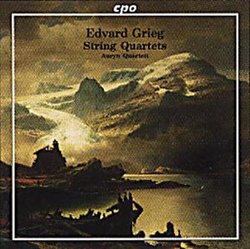| All Artists: Edvard Grieg, Auryn Quartet Title: Grieg: String Quartets Members Wishing: 0 Total Copies: 0 Label: Cpo Records Release Date: 7/17/2001 Genre: Classical Styles: Chamber Music, Historical Periods, Classical (c.1770-1830) Number of Discs: 1 SwapaCD Credits: 1 UPC: 761203972920 |
Search - Edvard Grieg, Auryn Quartet :: Grieg: String Quartets
 | Edvard Grieg, Auryn Quartet Grieg: String Quartets Genre: Classical
|
Larger Image |
CD Details |
CD ReviewsPolished performances of Grieg chamber music klavierspiel | TX, USA | 03/21/2004 (5 out of 5 stars) "It is not generally known that there are two string quartets by Grieg in the canon, the standard work in G minor, Op. 27, at first controversial, that subsequently became the model for Debussy's own effort in the medium; and an unfinished work dating from 1891 consisting of a substantial first movement and a shorter scherzo.The Auryn Quartet pairs Grieg's two quartets in worthy performances. The thickly chordal, almost orchestral sonorities of the G minor piece that caused much unfavorable comment when the work first appeared shine in their hands, though even they are stymied by the first movement's tendency to come to complete halts, rather than making smooth transitions between sections. They make the most of the alternately lyrical and spirited moods of the rest, the last movement in particular becoming an infectious virtuoso romp.The first movement of the unfinished quartet, edited for performance after Grieg's death, shows the composer leaning more toward the contrapuntal interplay of traditional string quartet-writing, with a greater concern for smooth formal transitions also evident. As such it is an interesting foil to the better-known complete work and one regrets that Grieg never finished it. Chamber music lovers can enjoy both of these works in polished, thoughtful performances on this CD. The only slight reservation that can be expressed is the short total duration of the recording, due to the fragmentary nature of the second quartet."
|

 Track Listings (6) - Disc #1
Track Listings (6) - Disc #1